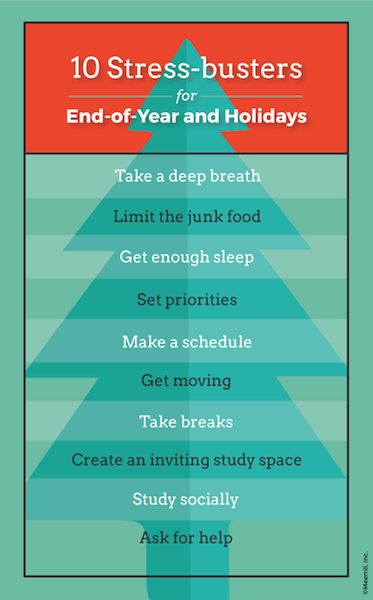Tag: challenges
Plan To Enjoy The New School Year

(We’re re-sharing another of our annual favorites – take charge of your new school year!)
Does it feel like summer’s gone, though the calendar doesn’t say so? Are you beginning to feel stressed? Could be because your summer break’s ending (104 days, calculated according to Phineas and Ferb). Good news – being back to school is not all bad! Understandably, starting a new school year and getting adjusted to a new schedule can make you tense, but with the right approach, the new school year can be more enjoyable than you expect.
Here are some simple tips that can make all the difference on how you feel about getting back to school and starting a new year/grade.

Check Your Attitude.
There are plenty of ways that you can mentally prepare for the upcoming year. Try to approach the year with a positive attitude – just think of all the fun experiences you’ll have along the way! For example:
- School’s the only time in your life you get to see so many of your friends every day.
- You can reconnect with your favorite teachers and maybe you’ll get some new ones.
- You get to do extracurriculars and school activities – with friends!
Depending on how you’ve spent your summer, going back to school might feel like a complete turnaround, so it’s worthwhile to set aside some time to refocus yourself. According to the American Psychological Association, mindfulness can be defined as “a moment-to-moment awareness of one’s experience without judgment.” Mindfulness techniques come with a whole host of proven psychological benefits, like stress relief, increased focus, and better memory. While it may not suit everyone, it might be worth a look and a discussion with your parents on whether you should try it!
Make A Plan.
A new year means a new schedule, and a new schedule always takes some getting used to. We know you’ll be busy between your school and your extracurricular activities, but the amount that you’ll enjoy the upcoming year depends on your ability to budget your time. Make a plan ahead of time to reduce your stress and help you feel on top of your school life, instead of being burdened by it.
Part of making a plan is taking into consideration what is hard for you and what is easier. Keep that in mind as you make choices, if writing reports takes more work, make a note to yourself to always get started earlier on your reports. If you tend to get tense about tests, cut yourself some slack and don’t schedule too much the evening before one. When you’re making a detailed schedule, which you should (and parents should help their younger children with this), use your planner to keep track of all your commitments, not just the ones for school.
Finally, make your plan bigger – think about what you want to get done at the end of the school year. If possible, mix in personal goals (want to try out a new sport) with academic ones (want to improve writing skills) and even social ones (make new friends) and think about how you can go about achieving them – you have the whole new year ahead of you to work on them!
Use Your Support Network.
Even if you’re mentally prepared for the new year and have everything planned out, you can be sure that things will come up unexpectedly. Maybe your teachers pile on some extra assignments all at once, or you miscalculated your time and your weekly schedule is all out of whack. And of course, there are all the social pressures that come with school that can sometimes feel overwhelming.
When things get tough, go to your support network. It can be a combination of friends, family, teachers, coaches, anyone you trust to have your back and give you the support you need and the advice you seek. Don’t be afraid to lean others from time to time, but be ready to repay the favor when someone needs to lean on you.
Keep in mind, if the pressure gets to be too much, don’t hesitate to see speak to trusted adults and request professional help. There is no shame in that (it happens to millions of people worldwide) and getting the right kind of support can help you feel a whole lot better.
These are just a few of the ways you can get ready to make the most out of the new school year. To kick it off, check out this song, a blast from the past you can listen to while you start planning your future. What are your favorite ways to get ready for school? Let us know in the comments below!
16 Aug, 2019
Dial Down The Holidays And Year-End Stress!

Yes, it’s that “most wonderful time of the year”! Well, maybe. There is the unavoidable holidays and the year-end stress as everything happens in a few short weeks, even if some of it is fun. For most students, the season becomes enjoyable only when school commitments are done and the winter break has begun.
Relax. It is possible to manage finishing assignments, writing reports and handling finals and still find it possible to enjoy the season with friends and family. It just takes a little planning and self-care – we’ll show you how!

Take Deep Breaths
Too many things to do? Just breathe. Start by inhaling slowly and exhaling deeply. It’s a scientific fact that deep breathing helps you relax. Best of all, you can do it anytime, anywhere, without any props!
Limit Junk Food
Hey, it’s the holidays. There will be tons of sugary, fatty goodies wherever you go. Go ahead and enjoy – some of it. Don’t overdo it and remember to balance it with good healthy food when you can. Your body will thank you with less stress!
Get Enough Sleep
If you feel tired, you’re really not going to do so well taking exams, turning in papers, or even playing video games with your friends. According to this article, lack of sleep drops you into an unhealthy spiral. When you create your schedule, put in time for sleep!
Set Priorities
As noted earlier, this time of year is full of things to do – what you must do, and what you want to do. Take time to figure out what is most important to you and your family (school work is pretty important too!) and feel free to decline invitations or postpone unnecessary work.
Make A Schedule
As with almost anything, a schedule is a must to help you stay on track and also make you feel you’re on top of things and consequently lowering the holiday and year-end stress. Whatever is your favorite planner, use it to list everything – school work, extra curricular, family and friend gatherings, personal time – it’ll help keep you on top of things.
Get Moving
You’ve heard this before. Exercise reduces stress, helps you sleep and helps work off the calories from those holiday goodies! It can be fun too, especially if you go play a sport with a team or go for a run with friends.
Take Breaks
Self-care is critical. Having some downtime to listen to music, watch a favorite show, hang out with friends or bake cookies, will help keep your mind feeling refreshed and your whole self a little more relaxed.
Create An Inviting Study Space
Yes, you have to do your school work though the holidays are here. Go ahead and have some fun decorating your space, however you like it. Your space will make studying feel a little merrier!
Study Socially
If you can, take a break from solo studying and do it with your classmates. Prepping for a history test can be less stressful with friends (unless group-study doesn’t work for you). You can gather together for some holiday goodies and then bust out the books, or if you can’t meet in person, gather online for a little study-and-chat time.
Ask For Help
It it gets to be too much for you, and you’re feeling overwhelmed, ask for help. Your family, friends and teachers can help you with the academic challenges. And ask for help if your stress is getting to be more than you can handle – your family and teachers can give you the guidance you need.
Notice something about these tips? They could be useful for anyone who’s juggling a lot of to-dos and is being crushed under the holidays and year-end stress, so feel free to share.
The Meemli team wishes you happy, stress-free holiday season!
30 Nov, 2018
7 Study Habits To Help You Succeed At School
With the seemingly endless projects, homework and tests at school, you may feel it’s impossible to manage it all. But it’s not quite that bad. Adopting effective study habits can help you get and stay ahead of the curve and achieve better grades. (Parents: these will help your younger children too!)
Here are our top recommendations for study habits that can help you win at school, college, or anytime you have to, you know, study.

Have Goals In Mind
Think about what you want to achieve this school year. Clearly defined goals, both big and small, will give you something to work towards. Make them realistic, but don’t be afraid to dream big either. Also, don’t burden yourself with too many goals. Keep them short and easy to remember and have them somewhere handy whenever you need a motivation boost.
No Distractions
Find a quiet place with as few distractions as possible. Mute your phone, turn off the TV, and if you’re sharing the room with someone else, limit your conversations. If you like to listen to music while working, choose mellow music with no lyrics. Working without distractions will help you focus on the task at hand and get into your zone.
Use A Planner
Keeping a day planner is the most important thing you can do to improve your study habits. It’s easy to lose track of all the things you’re supposed to do, especially if you’re also juggling extracurricular activities or other commitments.
As soon as you find out the due dates for your assignments, projects, tests etc., make sure to write them down. You can write down your scheduled tasks in an actual hardcopy day planner, but there are many digital calendars that can keep you on track too.
Food For Thought (Literally)
If you can’t live without chips and cokes, cookies and milkshakes, this suggestion might make you groan, but give it a shot anyway. Studies show that eating healthy foods like whole grains, fish, vegetables, and nuts will help you think more clearly and give you more energy for those long study sessions. On the other hand, junk food will leave you feeling tired, lethargic, and with a cloudy mind. Some suggest drinking green tea and taking daily supplements like multivitamins and Omega-3 capsules can also help boost studying performance – but as with all things dietary, check with your doctor and/or your parents first!
Work At Peak Times
Are you an early bird or a night owl? Some people tend to get their best work done first thing in the morning, others seem to get be at their best late at night. Start to become aware of what time of day your brain feels most “alive”. You’ll get your work done more efficiently and you’ll understand the material better during these hours.
Handwrite Your Notes
Instead of typing them down in your laptop, write your class notes by hand. Writing each word one by one forces you to process and remember the material that you’re covering. If your instructor goes through the lecture too quickly, feel free to type out your notes in class, but make sure to spend some time to write them down in your notebook later. Also, if you think of any ideas, write them down immediately. Once those thoughts leave your head, they’re gone forever.
Persist
Most importantly, don’t give up. Fully commit yourself to your studies. If you lose some motivation, focus on the goals you set for yourself. Hold yourself accountable and keep on grinding. You’ll see an improvement in your performance at school. Once you see the results of all of your hard work, you’ll be glad you stuck with it!
Doing well in school isn’t an easy task, but since you’re reading this post, you surely have the motivation within you to do it. By adopting a few good study habits, you’ll see some big improvements in your academic life. What techniques have helped you succeed in school? We’d love to hear about them!
26 Sep, 2018
New School Year Challenges – How Can You Help?
The end of summer break is like a ‘reset’ button, immersing students in the ‘new’: new teachers, new classes, new locker combinations, new peers – and new school year challenges.
The challenges can seem daunting but a little awareness and prep can help your child zip past them and get on track for success. Here’s how.

The Structured Life.
No more “What shall we do today?”. The school year brings structure back, and it helps if you build routines to keep life running smoothly. By the time your kid is in middle/high school, you know the drill and are geared up to have The Plan up on the fridge (and on everyone’s online calendars!). But school demands, your child, and life, have changed in the past year, so here you go again.
Build a new routine for this year, paying attention for what’s needed now.
Make sure your child is the primary creator of the routine, not you as she has to own and follow it.
Leave enough time for sleep. Lack of sleep affects your child’s physical, emotional and brain health and, of course, performance in school (teachers can attest to that!).
Help your child block out time every day for some feel-good activity. Relaxing for little while shooting hoops with friends or watching a favorite dance show on TV helps keep stress levels down.
Don’t expect everything to work from Day 1! Both your child and you should prepare to roll with it and adjust as needed.
Expectations, with Due Dates Attached.
School also brings deadlines for book reports, weekly quizzes and voluminous homework. Switching from the easy, lazy days of summer vacation to the constant demands of school is difficult for most students, but these three simple coping techniques will help.
Schedule the Work
Three words: use a planner. Schools usually provide planners/agendas for all students, get one if your child’s school doesn’t. Generally, successful students keep track of deadlines. I have never had a student who was diligent about due dates fail my class.
Using a planner is a very useful life skill, but initially hard for most adolescents. Help your child in developmentally appropriate ways. For a middle schooler this might mean a daily check with the planner, while high schoolers may only need a weekly conversation or a monthly review to make sure academics and extra-curriculars are all balanced.
Teach your kids to pace out assignments. When I’ve done this with students, I can see the light bulb go on: “You mean, I have to read 10 pages every night to finish this 200 page book in three weeks?!” Exactly. But then they get it and feel more in control.
Ask the Teacher
Successful students do not hesitate to ask teachers questions. Most teachers love it as it signals to them that a student is interested in learning, but many students are diffident, especially with new teachers. Encourage your child to start with simple questions early in the year (“Ms. Jones, could you point me to room 112?”) so he’s comfortable asking for guidance whenever he needs it.
Provide Support
If your child is struggling with any part of the academics, it is best to address it as soon as possible. Maybe you and your child already know that she’s comfortable with science but struggles with writing. If so, acknowledge it early on, and offer to assist her. If you can’t do it yourself, get outside support. Your child will be much less stressed knowing that if needed, she can get guidance from teachers, peers, outside tutors or online resources.
The Social Jungle.
Adolescents are busy figuring out identity: Who am I? Who will I become? And there’s the desire to belong, to fit in, and the inevitable concerns about popularity. There is no way to “save” your child from these social pressures, no way to prevent them from having to make hard choices. But you can help them run the social gauntlets relatively unscathed.
Communicate
Teach your child to talk through issues, if not with you, with other trusted adults, older siblings, or the best friend now at another school. Your child should know that she’s not alone.
To keep your child communicating with you, stay involved and most importantly, tolerate minor changes. Chartreuse hair? Incomprehensible music? As a teacher, I’ve seen that when students feel accepted, they tend to behave more acceptably and push back when they feel judged. As a parent you should help reduce your child’s stress, not contribute unduly to it.
Maintain Perspective
Even if schools are doing more to help students adjust, transitioning back to school, especially a new one, can be overwhelming. Help your child understand (and you should too!) that this is normal. Reassure them that in a few weeks, the unfamiliar and uncomfortable may seem boringly routine. With a little nudging, they may remember times when they dug into their own resilience and survived and feel confident they can do so again. Fights with friends and “OMG! I’m so embarrassed!” moments do fade with time.
Get Help
Also, it helps to remember that every child is unique and what is easy for one may be anxiety-inducing for another. Be patient, but if you notice that you son or daughter is not doing better, don’t hesitate to speak to the counselor or seek professional help – it may not be possible for you or your child to resolve on your own.
Change creates challenges, but they don’t have to be crushing. And your child is learning a valuable life skill by dealing with them.
How do you and your child approach the new school year? Let us know!
21 Aug, 2018
New School Year Checklist for Parents

The start of a new school year is stressful for students of course, but the transition from summer relaxation to the packed schedule of school is tough on parents too. Whether your child is moving into middle or high school, or just going back to start a new grade, there are some essential steps you can take early on for smooth sailing the rest of the year.
1. Stock Up.
-
- Old school: Schools usually have their supply needs down to a science, but there are always those items that your child seems to run out of throughout the year. Save yourself time and expense by purchasing items in greater quantity now. We love this basic supplies list from Real Simple.
- New school: It is important to consider digital accessibility for school assignments be it laptop, desktop or tablet. If those items are shared between family members plan out access in advance to avoid conflicts later!
2. Build a Morning Routine.
-
-
- Plenty of Sleep! Making sure you get enough sleep (and your child does too) will pay enormous dividends in your ability to handle the hurried mornings and hectic days.
- Wake Up Time. Yes, your child is old enough to to be getting themselves out of bed on time. If you suspect the mornings may not run like clockwork just after summer vacation, consider adjusting your wakeup time to make sure you can help with unexpected snafus.
- Getting Ready. How can you make things as easy as possible for yourself during the daily prep-for-school process? Perhaps you do this by having lunch items prepped and ready in advance so they’re easy for you or your child to grab and pack. Review appropriate apparel choices that fit the school’s dress code with your child and either go through the closet in advance or create a system for checking in with each other.
- Take Care of Yourself. Whether it’s 10 minutes of guided meditation, or just a quiet cup of coffee before the alarms go off, putting moments in your morning to take care of your own needs are crucial to staying stress-free in the early days of the new school year.
-
3. Get it on the Calendar.
-
-
- Spread the Word! Get it on EVERYONE’s Calendar, not just yours. Make sure key dates are shared with your spouse, grandparents, childcare providers and anyone else who may be helping you with before and after school logistics.
- Put Your Dates on Your Child’s Calendar. Note your family’s business travel or special events on your child’s calendar to make sure they’re factored in when scheduling.
- Pay attention to the Extra-Curriculars. A new school year often means that your child may want to try a new activity, a new sport or join a new club. Be realistic about how much you and your child can handle and work with your child to select programs that work best for both of you.
-
4. Get to Know Your Child’s School
-
-
- Review the School’s Rules. Basic policies concerning dress code and cell phone use can vary widely from school to school. Read up on them to avoid any unpleasant surprises.
- Take a Tour. Understanding how the campus is laid out and how your child will travel throughout the school will make the transition seem less overwhelming.
- Review Your Child’s Subjects. Also understand the expectations of those courses. This can help you identify potential challenges in advance.
- Connect With Your Child’s Teachers. You don’t have to wait until you’re called in for a conference. Reach out to teachers at any point early in the year to learn more about the class itself or how your child is faring.
- Get to Know Other Parents. Parents of children the same age as yours are great for understanding shared experiences. Parents with children who have been in the school can help you understand how the school works from the parent perspective.
-
5. Offer Learning Support
-
-
- Check in Everyday. No matter what the quality of your school, check in with your child everyday and be prepared to help if needed.
- Offer Help Yourself. If you know when your child has quizzes or papers due, and you have the capacity for it, you can offer your assistance in preparing or reviewing.
- Line Up Resources. Acquaint yourself with the resources offered or recommended by the school or teachers for more structured help outside of the classroom. Also research online options, like Kahn Academy or Meemli to add to your list.
- Know How Your Child Learns. Discover how your child learns best, so you can select the option that will be the most useful for your child. Here’s a quiz that can help determine tween learning styles you can do on your own, and here’s one your teen or tween can do themselves.
-
We hope you find this list helpful in making the start of the new school year easier to manage. Let us know if you have other favorite tricks to breeze through back to school!





